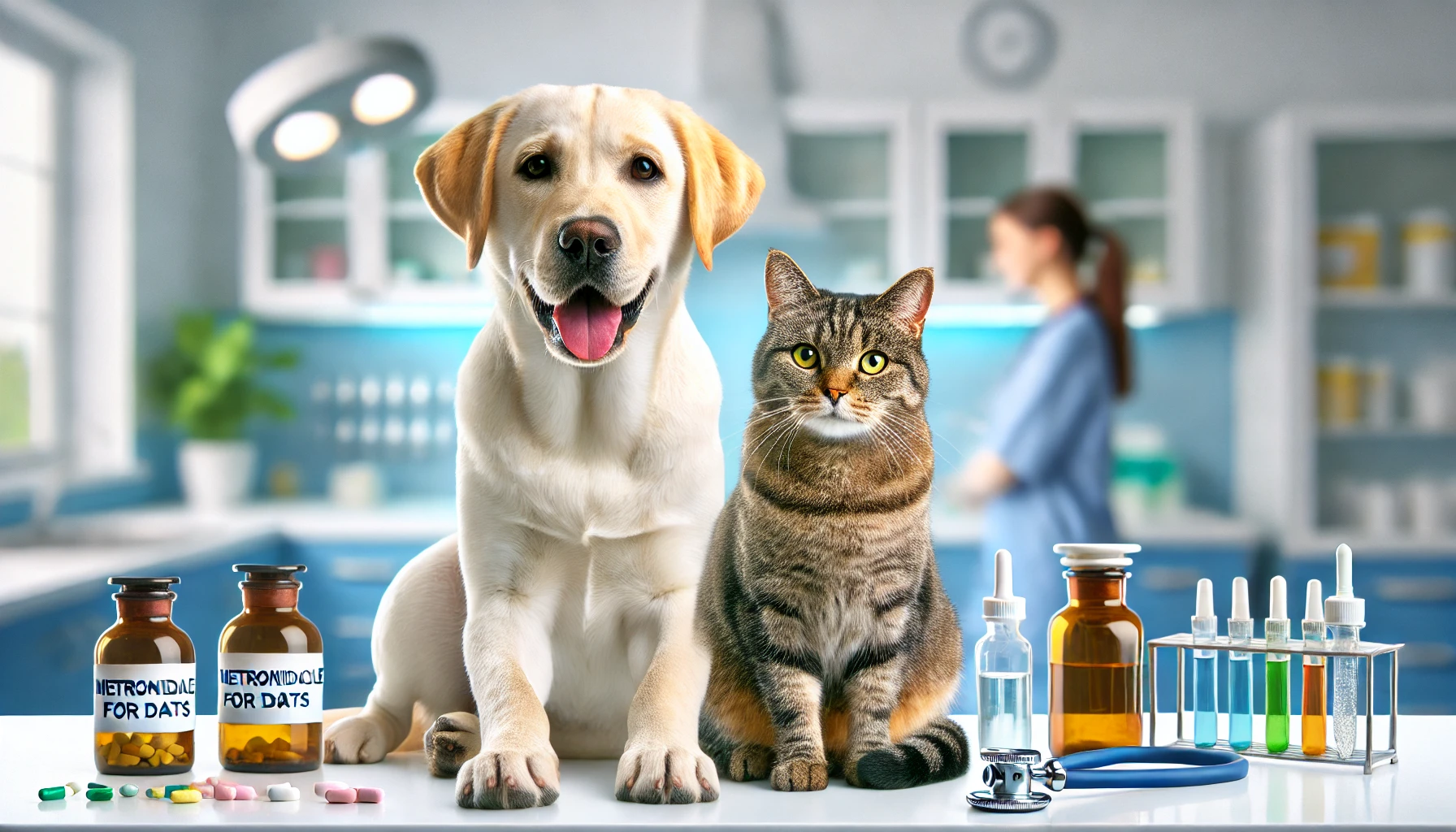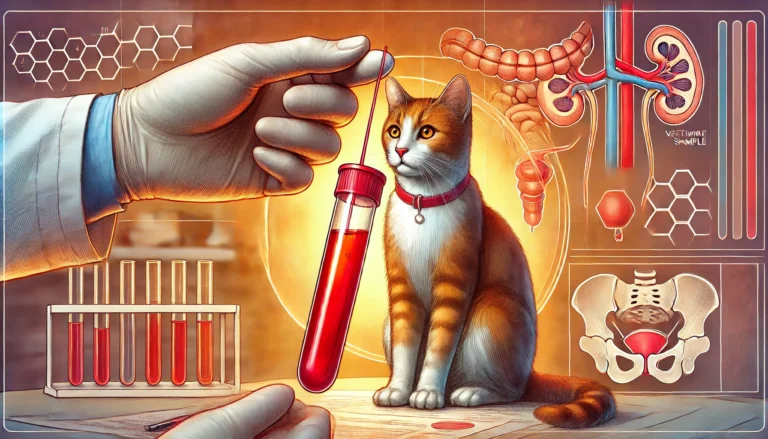Metronidazole for Dogs and Cats

Metronidazole for Dogs and Cats are helpfull?YES!Metronidazole is a widely used medication for both dogs and cats, commonly prescribed to treat various bacterial and parasitic infections. Known for its efficacy in combating gastrointestinal issues, dental infections, and other inflammatory conditions, it has become a staple in veterinary medicine.
Uses of Metronidazole for Dogs and Cats
Treating Gastrointestinal Infections
Metronidazole for Dogs and Cats is particularly effective in treating gastrointestinal issues caused by bacterial infections and parasites like Giardia.
Common Conditions in Dogs and Cats
- Giardiasis: A protozoan infection that causes severe diarrhea.
- Clostridial infections: Caused by Clostridium bacteria, leading to colitis and bloody stools.
- Inflammatory Bowel Disease (IBD): Helps manage chronic gut inflammation.
- Colitis: Treats inflammation of the colon, which leads to mucus in the stool and diarrhea.
Dental and Oral Infections
Metronidazole for Dogs and Cats helps address dental infections caused by anaerobic bacteria. Conditions like gingivitis and periodontal disease are effectively managed with metronidazole due to its anti-inflammatory and antimicrobial properties.
Treating Skin and Wound Infections
Deep wounds or puncture injuries can create an anaerobic environment where bacteria thrive. Metronidazole helps treat these infections, preventing abscesses and further complications.
Urinary and Reproductive Tract Infections
Metronidazole for Dogs and Cats can be prescribed for infections in the urinary tract and reproductive system, which may be caused by anaerobic bacteria.
Other Off-Label Uses
- Chronic diarrhea of unknown origin.
- Hepatic encephalopathy (a liver condition).
- Management of post-surgical infections.
Metronidazole Dosage for Dogs and Cats
General Dosage Guidelines for Dogs
- Giardiasis: 15–25 mg per kilogram of body weight every 12 hours for 5–7 days.
- Colitis and IBD: 10–15 mg per kilogram every 12 hours.
- Dental infections: Adjusted based on severity; consult your veterinarian.
General Dosage Guidelines for Cats
- Giardiasis: 10–20 mg per kilogram of body weight every 12–24 hours for 5 days.
- Colitis and IBD: 7.5–15 mg per kilogram every 12 hours.
Important Considerations for Dosage
- Always follow the prescribed dosage and schedule provided by your veterinarian.
- Administer Metronidazole for Dogs and Cats with food to minimize gastrointestinal upset.
- Complete the full course of medication, even if symptoms improve early.

Administering Metronidazole for Dogs and Cats
Oral Tablets and Capsules
- Hide the pill in a small amount of food or treats, such as cheese, peanut butter (for dogs), or soft treats for cats.
- Use pill pockets to make administration easier.
Liquid Suspension
- Measure the dosage carefully using a syringe or dropper provided with the medication.
- Administer the liquid into the side of your pet’s mouth slowly to avoid gagging.
Injectable Metronidazole for Dogs and Cats
- Injectable formulations are typically administered by veterinarians in severe cases or hospital settings.
Tips for Easier Administration
- Remain calm and gentle to keep your pet relaxed.
- Reward your pet after giving the medication to make the experience positive.
- If your pet refuses the medication, consult your veterinarian for alternatives.
Side Effects of Metronidazole for Dogs and Cats
Common Side Effects
Metronidazole is generally well-tolerated, but mild side effects can occur, including:
- Vomiting or nausea.
- Diarrhea or soft stools.
- Loss of appetite.
- Lethargy or low energy.
Serious Side Effects (Rare)
- Neurological symptoms: Seizures, tremors, or difficulty walking (ataxia).
- Liver toxicity: Yellowing of the gums or eyes (jaundice).
- Blood in urine or dark-colored urine.
What to Do If Side Effects Occur
- Stop administering the medication and consult your veterinarian immediately.
- Ensure your pet remains hydrated, especially if vomiting or diarrhea occurs.
Metronidazole Toxicity in Pets
Causes of Toxicity
Toxicity occurs if metronidazole is given in excessive doses or for prolonged periods. Smaller pets like cats may be more sensitive to high doses.
Symptoms of Metronidazole Toxicity
- Seizures or muscle tremors.
- Loss of coordination or inability to walk.
- Weakness or lethargy.
- Nausea, vomiting, and drooling.
Treatment for Toxicity
- Immediate veterinary intervention.
- Supportive care, including IV fluids, anti-seizure medications, and liver support.
Precautions When Using Metronidazole
Pets with Pre-Existing Conditions
Metronidazole should be used with caution in pets with:
- Liver disease (metronidazole is metabolized in the liver).
- Kidney dysfunction, as it may affect drug elimination.
- Neurological conditions like seizures.
Pregnancy and Nursing
Metronidazole is generally not recommended for pregnant or nursing pets, as it may affect fetal development.
Drug Interactions
Metronidazole may interact with other medications, such as:
- Phenobarbital: May reduce metronidazole effectiveness.
- Warfarin: Increases the risk of bleeding.
- Cimetidine: May increase the risk of toxicity.
Always inform your veterinarian of any medications or supplements your pet is currently taking.
DO YOU KNOW
Changes in routine, new environments, or separation anxiety can affect a Dog Constipationand digestive system, leading to constipation. Emotional stress may disrupt the normal digestive process, resulting in slower stool passage..
Alternatives to Metronidazole
When metronidazole is not suitable, alternative treatments may be recommended:
For Bacterial Infections
- Amoxicillin/Clavulanic Acid: Effective for broad-spectrum bacterial infections.
- Clindamycin: Often used for dental and soft tissue infections.
For Parasites
- Fenbendazole: A safe and effective treatment for Giardia.
- Ronidazole: Used for resistant protozoal infections.
For Inflammatory Conditions
- Corticosteroids: Helps manage inflammation in IBD.
- Probiotics: Supports gastrointestinal health naturally.
Conclusion
Metronidazole is a powerful and versatile medication for treating various bacterial and parasitic infections in dogs and cats. With proper administration, it can effectively manage gastrointestinal issues, dental infections, and other health concerns. By understanding its uses, dosage, and potential side effects, pet owners can ensure their furry companions receive the safest and most effective care. Always consult your veterinarian for guidance to guarantee the well-being of your pet throughout treatment.
Is metronidazole the same for cats and dogs?
Yes, Metronidazole for Dogs and Cats is essentially the same medication for both cats and dogs in terms of its chemical composition and purpose. It is an antibiotic and antiprotozoal drug used to treat bacterial infections, Giardia, and gastrointestinal issues in both species. However, the dosage, form, and treatment plan vary based on the weight, age, and health condition of the animal. Cats tend to require lower doses due to their smaller size and greater sensitivity to medications compared to dogs. It is critical to avoid self-prescribing metronidazole for either species and always follow the veterinarian’s recommendations, as improper dosages can lead to toxicity and severe side effects.
What is metronidazole used for in dogs?
Metronidazole for Dogs and Cats is commonly prescribed for dogs to treat a variety of infections caused by anaerobic bacteria and protozoa. It is highly effective for treating gastrointestinal conditions such as giardiasis, a parasitic infection that causes diarrhea, and colitis, which involves inflammation of the colon. Additionally, it is used to manage inflammatory bowel disease (IBD) due to its anti-inflammatory properties. Veterinarians may also prescribe metronidazole to treat oral infections, dental diseases, and deep skin or wound infections where oxygen-free bacterial growth is common. It is also occasionally used to address liver-related conditions like hepatic encephalopathy by reducing ammonia-producing bacteria in the gut.
What is the main function of metronidazole?
The primary function of Metronidazole for Dogs and Cats is to act as an antibiotic and antiprotozoal medication. It works by entering bacterial and protozoal cells, where it disrupts DNA synthesis and prevents the microorganisms from replicating, ultimately leading to their death. Metronidazole is particularly effective against anaerobic bacteria, which thrive in oxygen-free environments, and certain parasites like Giardia. It is widely used to treat gastrointestinal infections, dental diseases, inflammatory bowel conditions, and deep wounds. Additionally, metronidazole has anti-inflammatory properties, making it useful for managing conditions that involve gut inflammation or chronic diarrhea in both dogs and cats.
Is metronidazole the same for animals and humans?
Metronidazole for Dogs and Cats used for animals and humans is chemically identical. Both forms are used to treat bacterial and parasitic infections, and the active ingredient is the same. However, the key differences lie in the dosage, formulations, and additives. Veterinary formulations may contain flavorings, such as beef or chicken, to make it palatable for pets, while human versions are unflavored or sometimes coated. Even though the drug is similar, human metronidazole should never be given to pets without veterinary guidance, as improper dosages can cause toxicity in animals. Likewise, veterinary metronidazole should not be used in humans without a doctor’s recommendation.
Is metronidazole OK for humans?
Yes, Metronidazole for Dogs and Cats is widely used in humans to treat bacterial and parasitic infections. It is prescribed for conditions like bacterial vaginosis, trichomoniasis, giardiasis, and infections in the gastrointestinal tract, including diverticulitis and colitis. Metronidazole is safe for human use when taken as prescribed by a healthcare professional. However, it comes with certain side effects, such as nausea, dizziness, and a metallic taste in the mouth. It is essential to avoid alcohol while taking metronidazole, as it can cause severe reactions like vomiting and flushing. Always complete the full course of treatment to ensure the infection is fully resolved and avoid resistance.
Is there a difference between human and animal antibiotics?
Human and animal antibiotics often have the same active ingredients, meaning they are chemically identical. However, the formulations may differ in terms of dosage, additives, and flavorings. Veterinary antibiotics, for instance, may contain meat or poultry flavoring to make them more palatable for pets, while human antibiotics are often sugar-coated or tasteless. Additionally, dosages for animals are specifically calibrated based on their species, weight, and metabolism. Even though they may seem similar, it’s unsafe to interchange human and animal antibiotics without professional guidance, as incorrect dosages can lead to toxicity, antibiotic resistance, or treatment failure.
What happens if a human takes animal antibiotics?
If a human takes antibiotics formulated for animals, the effects depend on the type of medication and its dosage. While the active ingredient in animal antibiotics may be the same as those used for humans, veterinary formulations often include additives or flavorings that are not safe for human consumption. Dosage differences can also cause harm; animal antibiotics are dosed based on the pet’s weight, not a human’s needs. Taking the wrong dose could lead to toxicity, allergic reactions, or antibiotic resistance. Additionally, misuse of antibiotics can result in an incomplete treatment of an infection. Humans should only take antibiotics prescribed by a qualified healthcare provider.
What happens if a human eats dog medication?
If a human accidentally consumes dog medication, the results can vary depending on the drug, dosage, and the person’s health condition. While some medications, like antibiotics, may have similar active ingredients for both humans and pets, veterinary formulations often contain flavorings, preservatives, or other additives not approved for human use. These can cause gastrointestinal distress, allergic reactions, or toxicity. In some cases, consuming an incorrect dose of a medication could lead to severe complications. If accidental ingestion occurs, seek immediate medical attention, as healthcare professionals can assess the risk and provide the appropriate treatment.






